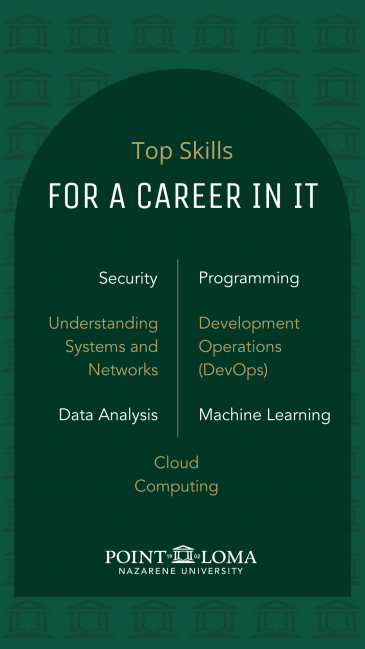
There are multiple avenues you can take with a degree in information technology (IT). And while some IT positions don’t require extensive education, they require the skills and abilities to implement solutions at a high level — skills that an IT degree program will help you to develop. Find out what information technology careers you can pursue and what it takes to thrive in these opportunities.
What is information technology?
Information technology is the use of computer systems or devices to access, store, retrieve, and send information. It’s a large and continuously growing industry in our workforce today — one that’s vital to business operations, personal data, and everyday activities.
Many large businesses and organizations have IT departments to ensure that their systems, networks, and data connect and function the way they’re supposed to. IT professionals cover everything from infrastructure and database management to cybersecurity, cloud computing, and machine learning.
It drives productivity and supports business functions. It’s the foundation of both our personal and professional lives, spanning all the ways we connect and communicate.
What is the outlook for IT jobs?
According to the U.S. Bureau of Labor Statistics, the computer and information technology sector is expected to increase employment by 13% from 2020 to 2030, which is significantly faster than the average for all occupations.
And according to the Computing Technology Industry Association (CompTIA), the global information technology market will have reached $5 trillion by the end of 2022. IT continues to be the biggest sector of the tech industry and the growth we’re seeing means plenty of new, stable, and lucrative IT jobs.
Although large inflation-related layoffs in the information technology industry within larger tech companies have interrupted some of this growth, small and mid-sized business hires have skyrocketed between February 2022 and the same month in 2023, presenting a growing demographic for information technology careers.
Additionally, the incentives for joining IT careers are multiplying. In California, for example, the minimum wage salary for computer software exempt employees increased to $50 per hour in 2022.
__________
It’s never too late to start your journey.
Earn your IT degree in as few as 15 months.
__________
5 of the top IT jobs in-demand right now
Here are some of the most in-demand IT jobs right now.
1. Computer support specialist
Average annual salary: $49,770
Projected employment increase: 6% (2021–31)
Education requirements: associate’s or bachelor’s degree
Computer support specialists provide technical help to computer users within an organization. They may troubleshoot local internet networks, perform maintenance, provide training to use hardware or software, or assist users with personal computer issues in-person or over the phone.
2. Computer hardware engineer
Average annual salary: $128,170
Projected employment increase: 5% (2021–31)
Education requirements: bachelor’s degree
Computer hardware engineers create computer hardware and software, paying close attention to research, development, compatibility with and comparison to existing products and competitors. They can work in every stage of development, from schematics and concepts to tests and launches.
3. Data warehouse analyst
Average annual salary: $96,710
Projected employment increase: 9% (2021–31)
Education requirements: bachelor’s degree
Data warehouse analysts organize large amounts of information by creating or customizing data storage systems. They also manage system administrators, backup data, ensure data security, and modify database structure as needed. Data warehouse analysts often work for larger companies that need to store and retrieve information in a user-friendly, bug-free environment.
4. IT project manager
Average annual salary: $159,010
Projected employment increase: 16% (2021–31)
Education requirements: bachelor’s degree and relevant work experience
IT project managers plan all computer-related functions within an organization. They may analyze or interpret data to determine an organization’s needs, manage an organization’s hardware and software on a large scale, and work with vendors to get the best service within the organization’s budget.
They may manage or plan the IT team’s day-to-day duties, research and plan technological upgrades, and ensure cyber security. IT project managers are experiencing a high growth rate at 16%.
5. Systems analyst
Average annual salary: $99,270
Projected employment increase: 9% (2021–31)
Education requirements: bachelor’s degree
Systems analysts manage industry- or organization-specific computer systems to ensure that an organization is productive within the systems they use. They may configure software, analyze costs of active or alternative products, and find ways to add functionality within computer programs used by an organization. They consult with IT or work with individuals and teams to make sure they’re able to perform their duties within their appropriate information systems.
What are the must-have skills for an IT career?
Beyond the core skills necessary for any profession, like communication, adaptability, creativity, collaboration, and emotional intelligence, there are seven in-demand skills that will make you a successful candidate for an IT career.

The top must-have skills for IT are:
- Security: A foundational IT skill, security is important in almost all tech jobs. You’ll want to know how to install firewalls and routers, encrypt data, mitigate risk and analyze any threats, understand compliance regulation and ethical hacking, and become familiar with physical, software, and network security.
- Programming: In order to develop software, websites, and applications, you’ll need to know how to program. Gaining a basic understanding of some of the top programming languages like Python, C++, and JavaScript is a great starting place.
- Understanding systems and networks: Whether you work in cloud administration, security, or any number of jobs, you’ll most likely be required to ensure systems and networks are running smoothly. Troubleshooting, installing and configuring hardware and software, and maintaining all forms of networks will be key to your success.
- Data analysis: Data analysis and statistics are also helpful skills for finding inefficiencies within operations. By learning Structured Query Language (SQL) and Python, you’ll be able to provide enormous value to your team.
- Development operations (DevOps): DevOps is a skill that focuses on bridging the spheres of software development and IT teams. Having this skill means you’ll help businesses continue to deliver their products quickly and efficiently.
- Cloud computing: Cloud computing is another necessary skill that will allow you to do everything from building cloud infrastructure to providing ongoing maintenance for cloud platforms.
- Machine learning: This is a very useful skill for programmers and data analysts. If you’d like to work with artificial intelligence, this skill, along with others mentioned above, will be vital to your success and growth in the industry.
If you cultivate these skills, you’re guaranteed to enhance your IT career and gain the attention of tech employers.
What will you learn with a degree in information technology?
A degree in information technology will allow you to learn about the relationships between humans and computers. It will train you how to store, secure, manage, retrieve, and send information.
You’ll learn about both hardware (physical equipment) and software (operating systems and applications). You’ll gain the skills to lead or be an integral part of a technical team responsible for the infrastructure and assets of a business, no matter the industry.
Courses offered in this program include hardware and networking, operating systems and security, database design, web and visual programming, management of information systems, and more.
Whether you’re looking to continue your career in technology or wanting to take steps in a new direction, a degree in information technology will help you establish yourself in a promising, much-needed field.
Get your degree in IT at PLNU
Make a more connected world possible through IT. Learn more about PLNU’s computer information technology bachelor’s degree completion program and take the next step towards your future.
